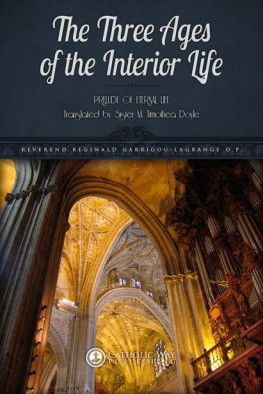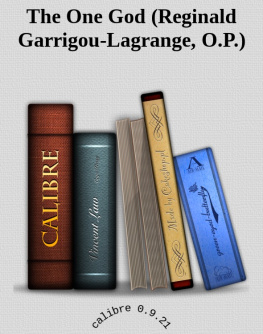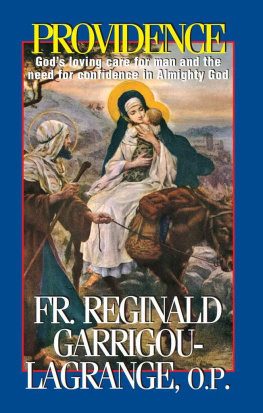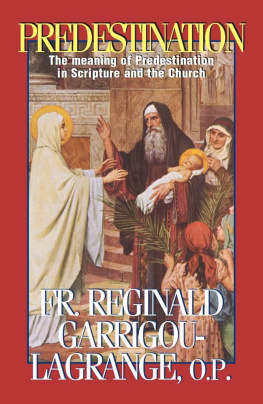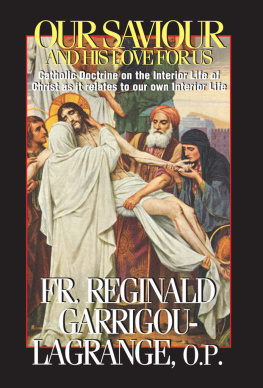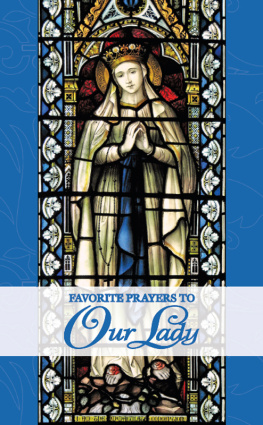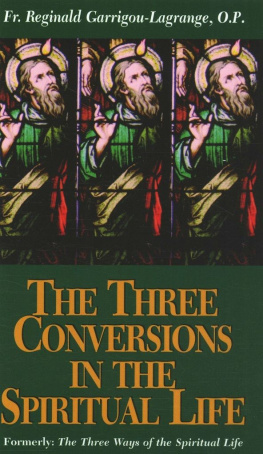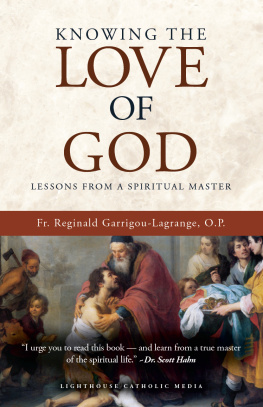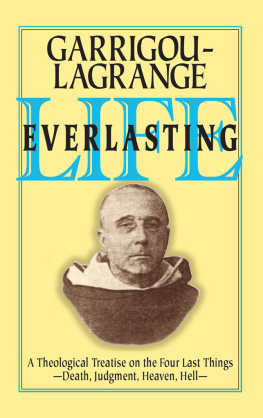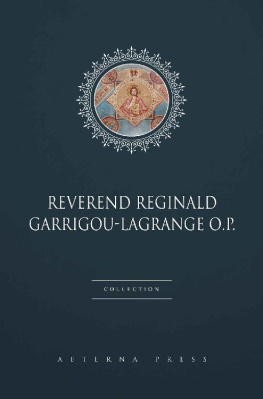PREFACE
This work represents the summary of a course in ascetical and mystical theology which we have been giving for twenty years at the Angelicum in Rome. In this book we take up in a simpler and higher manner the study of the same subjects that we treated in two other works: Christian Perfection and Contemplation and L amour de Dieu et la croix de Jesus . Complying with a request, we offer in this volume our preceding research in the form of a synthesis, in which the different parts mutually balance and illuminate each other. In accordance with advice from various groups, we have eliminated from this exposition discussions to which it is no longer necessary to return. The book thus conceived is accessible to all interior souls.
We have not given this study the form of a manual because we are not seeking to accumulate knowledge, as is too often done in academic overloading, but to form the mind, to give it the firmness of principles and the suppleness required for the variety of their applications, in order that it may thus be capable of judging the problems which may arise. The humanities were formerly conceived in this fashion, whereas often today minds are transformed into manuals, into repertories, or even into collections of opinions and of formulas, whose reasons and profound consequences they do not seek to know.
Moreover, questions of spirituality, because they are most vital and at times most hidden, do not easily fall into the framework of a manual; or to put the matter more clearly, great risk is run of being superficial in materially classifying things and in substituting an artificial mechanism for the profound dynamism of the life of grace, of the infused virtues, and of the gifts. This explains why the great spiritual writers have not set forth their thought under this schematic form, which risks giving us a skeleton where we seek for life.
In these questions we have followed particularly three doctors of the Church who have treated these matters, each from his own point of view: St. Thomas, St. John of the Cross, and St. Francis de Sales. In the light of the theological principles of St. Thomas, we have tried to grasp what is most traditional in the mystical doctrine of The Dark Night by St. John of the Cross and in the Treatise on the Love of God by St. Francis de Sales.
We have thus found a confirmation of what we believe to be the truth about the infused contemplation of the mysteries of faith, which seems to us more and more to be in the normal way of sanctity and to be morally necessary to the full perfection of Christian life. In certain advanced souls, this infused contemplation does not yet appear as a habitual state, but from time to time as a transitory act, which in the interval remains more or less latent, although it throws its light on their entire life. However, if these souls are generous, docile to the Holy Ghost, faithful to prayer and to continual interior recollection, their faith becomes increasingly contemplative, penetrating, and full of savor, and it directs their action while making it ever more fruitful. In this sense, we maintain and we explain what seems to us the traditional teaching, which is more and more accepted today: namely, that the normal prelude of the vision of heaven, the infused contemplation of the mysteries of faith, is, by docility to the Holy Ghost, prayer, and the cross, accessible to all fervent interior souls.
We believe also that, according to the doctrine of the greatest spiritual writers, notably of St. John of the Cross, there is a degree of perfection that is not obtained without the passive purifications, properly so called, which are a mystical state. This seems to us clearly indicated by all the teaching of St. John of the Cross on these passive purifications, and in particular by these two texts of capital importance from The Dark Night : The night of sense is common, and the lot of many: these are the beginners; In the blessed night of the purgation of sense, the soul began to set out on the way of the spirit, the way of beginners and proficients, which is also called the illuminative way, or the way of infused contemplation, wherein God Himself teaches and refreshes the soul without meditation or any active efforts that itself may deliberately make.
We have never said, moreover, as some have asserted we did, that the state of infused contemplation, properly so called, is the only normal way to reach the perfection of charity. This infused contemplation, in fact, generally begins only with the passive purification of the senses, or, according to St. John of the Cross, at the beginning of the full illuminative way such as he describes it. Many souls are, therefore, in the normal way of sanctity before receiving infused contemplation, properly so called; but this contemplation, we say, is in the normal way of sanctity, at the summit of this way.
Without fully agreeing with us, a contemporary theologian, who is a professor of ascetical and mystical theology in the Gregorian University, wrote about our book, Christian Perfection and Contemplation , and that of Father Joret, O.P., La contemplation mystique dapres saint Thomas dAquin : No one could seriously dispute the fact that this doctrine is remarkably constructed and superbly arrived at; that it sets forth with beautiful lucidity the spiritual riches of Dominican theology in the definitive form given to it in the sixteenth and seventeenth centuries by the great interpreters of St. Thomas, namely, Cajetan, Banez, and John of St. Thomas; that the synthesis thus presented groups in a strong and harmonious unity a considerable mass of teaching and experience of Catholic spiritual tradition; and that it allows the full value of many of the most beautiful pages of our great contemplatives to be brought out.
The author of these lines adds that everything in this synthesis is not of equal value and does not have the same authority. It is certain that after the truths of faith and the commonly received theological conclusions, which represent what is surest in the sum of theological science, what we put forward on the authority of St. Thomas and of his best commentators does not command our adherence to the same extent as the principles which are its foundation. Yet it is difficult to subtract from this synthesis a single important element without compromising its solidity and harmony.

